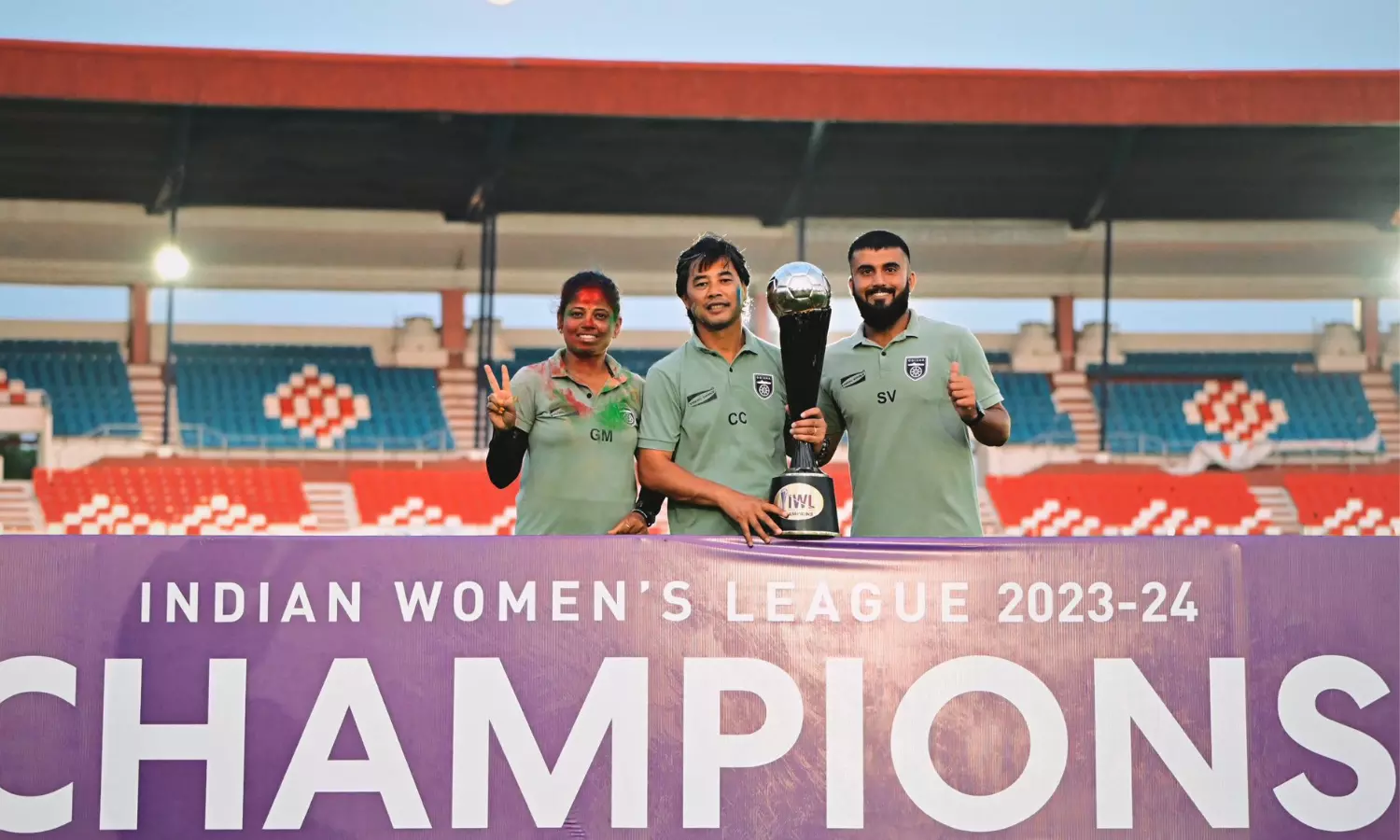Football
How Crispin Chettri's Odisha FC broke monopoly and won IWL
Crispin Chettri reflected on the journey of Odisha FC's IWL title-winning display and the evolving landscape of women's football in India.

Crispin Chhetri (Image credits to OFC/X)
These recent months have been nothing short of glorious for the Eastern Dragons. From securing their first major title in the Southern part of India to triumphantly claiming the league title on home turf, the team has been basking in glory.
For the past few years, the Indian Women's League had been under the monopoly of Gokulam Kerala, clinching the title three consecutive times. While occasional competition arose from teams like Sethu FC, the landscape saw a significant shift with the introduction of the Odisha FC Women's Team.
Taking the reins after guiding Sethu FC to a second-place finish, Crispin Chettri assumed leadership, and in just the second year of its establishment, the Juggernauts asserted their dominance in the IWL.
"It has been a great learning for me in Women's football," the maestro started talking. "Sethu was a good platform for me to learn and understand about women's football. I think the most challenging and most satisfying for me was when I did when we were runners up with Sethu FC because I was completely new to women's football and the players there were young upcoming players", he said.
One step at a time
Odisha FC were knocked out by Gokulam Kerala in the last edition of IWL. Locking horns with the dominant teams is not easy, but what made it easier was the proper understanding and planning.
"The main thing for us was that, we already knew what we wanted. We wanted to have a quality foreigner, not only a foreigner who can score but a foreigner who can deal with the team also. Team bonding and working as a family was much more important", he said.
The team did beat Gokulam at their home but ended up losing in the reverse fixture at home. The defeat was in a crucial stretch of the season. " The defeats affect the way you see it. Maybe it was a wake-up call for the players to pull up their socks and be much more clinical in finishing and reorganizing themselves.", he emphasized.
"We knew that we had to win all four matches to get our hands on the trophy. That's also why having great characters in the dressing room helps. We had senior players who always came onto the field and motivated the young ones," he added.
Chhetri reflected on the team's approach to each match, emphasizing a relaxed mindset focused on enjoying the game and taking each encounter one step at a time.
"When we started on this journey four months ago, our focus wasn't solely on winning the championship. Instead, we approached each match one at a time, aiming to secure victory in each encounter. Whether we won by a narrow margin or with a significant goal difference, our primary objective remained unchanged: to win," he explained.
He noted that the burden of expectation was largely on Gokulam Kerala FC, the defending champions for the past three years, "We deliberately avoided putting excessive pressure on the players and encouraged them to simply enjoy the game. The pressure, in my opinion, was predominantly on Gokulam Kerala FC, considering their status as defending champions for the past three years. As for us, we are relishing every moment of our journey," he added.
Impact of the new format
This season, the Indian Women's League witnessed a significant upswing in both quality and competitiveness compared to previous years. Rather than being characterized by high-scoring matches, the season showcased a surge in closely contested games.
Crispin believes that some of these improvements are due to the implementation of the home and away format.
"After one match we are getting at least four to five days to regroup and organize our team tactically. We can plan according to the opponents because when it is a centralized venue we have to play matches one day after another day. So here now coaches can come to regroup the player and tactically plan for the opponent," he asserted.
Addressing the financial burdens associated with advancing women's football, Crispin Chhetri stressed the necessity of collaboration between federations and clubs.
"For the improvement of women's football, this is the best way forward. But there will be a financial burden on the clubs because you have to travel and stay outside. The clubs and the federation have to see in what way the federation can help minimize the expenditure of the traveling teams," he said.
From next season the window for IWL will be extended to six months as compared to four months currently.
"Six month window implies that we might need to start one month earlier, resulting in seven to eight months of proper training, including matches, practices, and traveling. With just one month of play, teams would only train for two or three months," Chettri appreciated the move.
He contemplated the potential benefits of extending the football season, noting, "With a four-month season, like we had before, we observed notable progress in players over five to six months." He elaborated on the advantages, "Extending it to seven months would lead to even greater development in terms of their understanding of the game, fitness levels, and technical and tactical abilities," he said.
Chettri emphasized the positive impact this extended season could have on players' readiness for national team camps, suggesting that they would be in optimal condition upon arrival. He concluded by highlighting the potential for coaches to focus more intently on tactical aspects, given the players' enhanced physical and technical preparedness.

